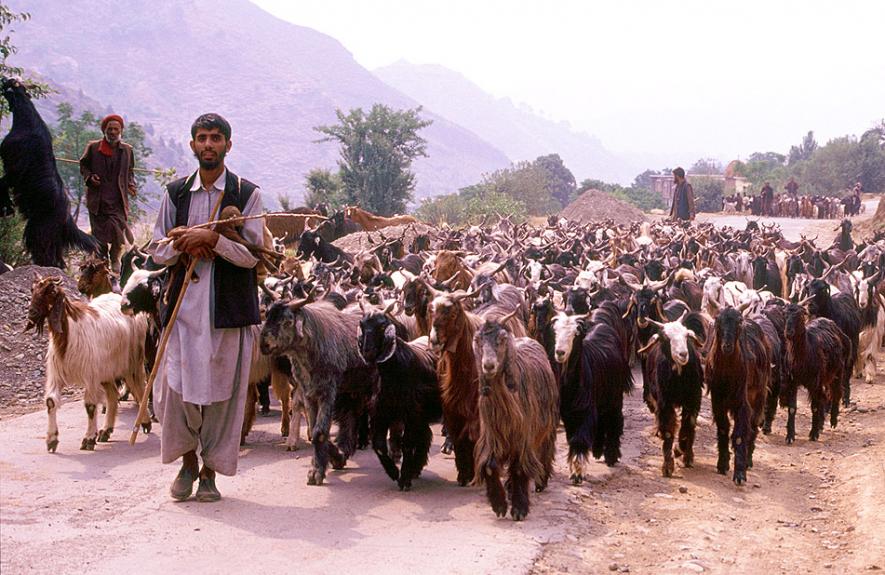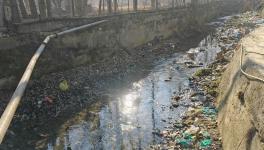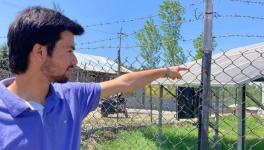J&K: Unable to Sell Produce, Gujjars and Bakarwals Struck Hard by COVID-19

Representational image. | Image Courtesy: Wikipedia
The COVID-19 crisis has also affected the lives of members of the Gujjar and Bakarwal communities. The latter, a tribal community in the Union Territory of Jammu and Kashmir, sustain themselves on commodities – meat, eggs, milk etc – produced from their own livestock.
NewsClick had earlier reported on how the tribal community was facing difficulty migrating, with Bakarwals delaying their upward movement due to the lockdown. Members of the community say that not much has changed. They are still facing obstacles in selling produce and buying fodder for their livestock.
With COVID-19 cases increasing in Jammu and Kashmir, members of the community say that it is becoming harder to sell their dairy products. The fear of contracting the virus is resulting in dwindling finances and huge losses for them. The total number of COVID-19 cases in Jammu and Kashmir is 30,717, with 578 deaths reported so far.
Khattana, a member of the community from Doda told NewsClick that people from the state were “afraid to buy our produce. Earlier, we would sell cheese, milk and meat from our livestock. The money we made from selling the produce helped us to survive and fulfil our basic needs,” he added.
Khattana said that since the virus began spreading members of the community are being asked for negative COVID-19 tests before people buy their produce. “People look at us with scepticism, saying ‘yeh log pata nahi kahan kahan se aaye honge, kitne logon se mile honge’ (We don’t know from where these people may have come from and how many others they would have met).”
According to the 2011 Census, Gujjars and Bakarwals constitute 11.9% of the total population of Jammu and Kashmir. Together, they form the third largest ethnic group in the UT. Their population is spread across 21 districts of J&K with their highest numbers living in Jammu, followed by Kashmir.
The tribal population follows a migratory pattern. They are constantly on the move with their livestock, moving from the lowlands of Jammu to the upper reaches during summer, then moving downhill during the winters.
Kathua district in Jammu has a high number of Gujjars. Locals said that shopkeepers are taking advantage of the crisis by buying milk at about half the price. Rafi, a member of the community from Kathua, said that they would sell a litre of milk at Rs 40 earlier. “Now, shopkeepers are buying one litre for Rs 15 and when we insist, they use the coronavirus as an excuse.” he added.
However, Rafi said that locals have helped his community survive by not asking for the rent in the last five months. “The zamindars have not asked for the rent as they know that we are going through a crisis. But we have to pay the rent, if not right now, then later; we are in a lot of debt and it’s becoming unbearable.”
Another member of the community from Kathua, who wished to remain anonymous, said that shopkeepers are profiting by deceiving them. “Whenever we will sell milk to the shopkeepers, they say that people are not buying our milk because of the coronavirus, so we should sell them at half the price or lesser. However, when people are not buying the milk then why are shopkeepers in-turn buying from us in the first place?” he asked.
Members of the community said that with no money and mounting debt, it is difficult for them to feed their livestock. Guftar Chowdhary, a tribal activist, told NewsClick that members of the community in Poonch, Rajouri and other areas are at least able to feed their livestock because of the open fields and grass. “But the gujjar living in Samba and Kathua cannot and are dependent on the market,” he added.
Rafi wants the government to intervene come up with a plan for them. He said that aside from local shops, government diaries buy 300 litres of milk a day, which is too less.
“They need to increase the limit to 1000 litres at least. It will be very helpful for us and people will also get better quality milk,” he added.
Get the latest reports & analysis with people's perspective on Protests, movements & deep analytical videos, discussions of the current affairs in your Telegram app. Subscribe to NewsClick's Telegram channel & get Real-Time updates on stories, as they get published on our website.
























